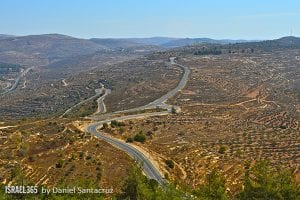
TORAH
NEVI'IM
KETUVIM
I - Chapter 2
Translation and Transliteration of
Listen to this chapter in Hebrew:
- Commentary
- Buy E-book
- Buy the Israel Bible
1And Chana prayed: My heart exults in Hashem; I have triumphed through Hashem. I gloat over my enemies; I rejoice in Your deliverance.
va-tit-pa-LAYL kha-NAH va-to-MAR a-LATZ li-BEE ba-do-NAI RA-mah kar-NEE ba-do-NAI RA-khav pee al o-y'-VAI kee sa-MAKH-tee bee-shu-a-TE-kha
אוַתִּתְפַּלֵּל חַנָּה וַתֹּאמַר עָלַץ לִבִּי בַּיהֹוָה רָמָה קַרְנִי בַּיהֹוָה רָחַב פִּי עַל־אוֹיְבַי כִּי שָׂמַחְתִּי בִּישׁוּעָתֶךָ׃
![]() 2:1 And Chana prayed
2:1 And Chana prayed
Chana’s prayer of thanksgiving, recorded in this chapter, is considered a model prayer. In her time, there was still no established liturgy, and there was not yet any concept of organized prayer among the Israelites. Chana’s prayer was a spontaneous expression of her deep spirit, after finally being blessed with the child for whom she had desperately longed. Over 3,000 years later, another Jewish heroine with the same first name would be born — Chana Senesh. Born in Hungary in 1921, she fulfilled her Zionist dream and immigrated to the Land of Israel. During World War II, she daringly volunteered to parachute into Nazi-occupied Europe to assist the British army and the Hungarian Jewish community. Tragically, she was caught, tortured and executed. Throughout her life, Senesh composed beautiful poetry; the most prominent one for which she is remembered is Eli (אלי) — ‘My God’, which she wrote on the shores of Caesarea. Like her biblical namesake Chana, the deepest expression of Senesh’s soul is her prayer: “My God, My God, may these things never end, the sand and the sea, the rustle of the waters, the lightning of the heavens, the prayer of Man.”

Hannah Senesh (1921-1944)
2There is no holy one like Hashem, Truly, there is none beside You; There is no rock like our God.
באֵין־קָדוֹשׁ כַּיהֹוָה כִּי אֵין בִּלְתֶּךָ וְאֵין צוּר כֵּאלֹהֵינוּ׃
3Talk no more with lofty pride, Let no arrogance cross your lips! For Hashem is an all-knowing Hashem; By Him actions are measured.
גאַל־תַּרְבּוּ תְדַבְּרוּ גְּבֹהָה גְבֹהָה יֵצֵא עָתָק מִפִּיכֶם כִּי אֵל דֵּעוֹת יְהֹוָה ולא [וְלוֹ] נִתְכְּנוּ עֲלִלוֹת׃
4The bows of the mighty are broken, And the faltering are girded with strength.
דקֶשֶׁת גִּבֹּרִים חַתִּים וְנִכְשָׁלִים אָזְרוּ חָיִל׃
5Men once sated must hire out for bread; Men once hungry hunger no more. While the barren woman bears seven, The mother of many is forlorn.
השְׂבֵעִים בַּלֶּחֶם נִשְׂכָּרוּ וּרְעֵבִים חָדֵלּוּ עַד־עֲקָרָה יָלְדָה שִׁבְעָה וְרַבַּת בָּנִים אֻמְלָלָה׃
6Hashem deals death and gives life, Casts down into Sheol and raises up.
ויְהֹוָה מֵמִית וּמְחַיֶּה מוֹרִיד שְׁאוֹל וַיָּעַל׃
7Hashem makes poor and makes rich; He casts down, He also lifts high.
זיְהֹוָה מוֹרִישׁ וּמַעֲשִׁיר מַשְׁפִּיל אַף־מְרוֹמֵם׃
8He raises the poor from the dust, Lifts up the needy from the dunghill, Setting them with nobles, Granting them seats of honor. For the pillars of the earth are Hashem's; He has set the world upon them.
חמֵקִים מֵעָפָר דָּל מֵאַשְׁפֹּת יָרִים אֶבְיוֹן לְהוֹשִׁיב עִם־נְדִיבִים וְכִסֵּא כָבוֹד יַנְחִלֵם כִּי לַיהֹוָה מְצֻקֵי אֶרֶץ וַיָּשֶׁת עֲלֵיהֶם תֵּבֵל׃
9He guards the steps of His faithful, But the wicked perish in darkness—For not by strength shall man prevail.
טרַגְלֵי חסידו [חֲסִידָיו] יִשְׁמֹר וּרְשָׁעִים בַּחֹשֶׁךְ יִדָּמּוּ כִּי־לֹא בְכֹחַ יִגְבַּר־אִישׁ׃
10The foes of Hashem shall be shattered; He will thunder against them in the heavens. Hashem will judge the ends of the earth. He will give power to His king, And triumph to His anointed one.
a-do-NAI yay-KHA-tu m'-ree-VAV a-LAV ba-sha-MA-yim yar-AYM a-do-NAI ya-DEEN af-say A-retz v'-yi-ten OZ l'-mal-KO v'-ya-RAYM KE-ren m'-shee-KHO
ייְהֹוָה יֵחַתּוּ מריבו [מְרִיבָיו] עלו [עָלָיו] בַּשָּׁמַיִם יַרְעֵם יְהֹוָה יָדִין אַפְסֵי־אָרֶץ וְיִתֶּן־עֹז לְמַלְכּוֹ וְיָרֵם קֶרֶן מְשִׁיחוֹ׃
![]() 2:10 He will give power to His king, and triumph to His anointed one
2:10 He will give power to His king, and triumph to His anointed one
Chana is a prophetess, and so she prays not only for herself, but for the entire nation of Israel. While thanking Hashem for her own child, she also prays for two separate leaders who will shape the nation: “His king” and “His anointed one.” The famed commentator Radak notes that Chana knew that her son would be responsible for establishing the monarchy over the people of Israel. Thus, “His king” refers to Shaul, who would be the only king from his tribe of Binyamin, and “His anointed one” refers to David, from the tribe of Yehuda, who would establish the eternal monarchy that would span the generations. Chana is thus a role model, teaching us to look beyond our individual needs when we pray, and also to long for the reestablishment of the kingdom of David at the hands of his descendant, the Mashiach.
11Then Elkana [and Chana] went home to Rama; and the boy entered the service of Hashem under the Kohen Eli.
יאוַיֵּלֶךְ אֶלְקָנָה הָרָמָתָה עַל־בֵּיתוֹ וְהַנַּעַר הָיָה מְשָׁרֵת אֶת־יְהֹוָה אֶת־פְּנֵי עֵלִי הַכֹּהֵן׃
12Now Eli's sons were scoundrels; they paid no heed to Hashem.
יבוּבְנֵי עֵלִי בְּנֵי בְלִיָּעַל לֹא יָדְעוּ אֶת־יְהֹוָה׃
13This is how the Kohanim used to deal with the people: When anyone brought a sacrifice, the Kohen's boy would come along with a three-pronged fork while the meat was boiling,
יגוּמִשְׁפַּט הַכֹּהֲנִים אֶת־הָעָם כָּל־אִישׁ זֹבֵחַ זֶבַח וּבָא נַעַר הַכֹּהֵן כְּבַשֵּׁל הַבָּשָׂר וְהַמַּזְלֵג שְׁלֹשׁ־הַשִּׁנַּיִם בְּיָדוֹ׃
14and he would thrust it into the cauldron, or the kettle, or the great pot, or the small cooking-pot; and whatever the fork brought up, the Kohen would take away on it. This was the practice at Shilo with all the Israelites who came there.
ידוְהִכָּה בַכִּיּוֹר אוֹ בַדּוּד אוֹ בַקַּלַּחַת אוֹ בַפָּרוּר כֹּל אֲשֶׁר יַעֲלֶה הַמַּזְלֵג יִקַּח הַכֹּהֵן בּוֹ כָּכָה יַעֲשׂוּ לְכָל־יִשְׂרָאֵל הַבָּאִים שָׁם בְּשִׁלֹה׃
15[But now] even before the suet was turned into smoke, the Kohen's boy would come and say to the man who was sacrificing, “Hand over some meat to roast for the Kohen; for he won't accept boiled meat from you, only raw.”
טוגַּם בְּטֶרֶם יַקְטִרוּן אֶת־הַחֵלֶב וּבָא נַעַר הַכֹּהֵן וְאָמַר לָאִישׁ הַזֹּבֵחַ תְּנָה בָשָׂר לִצְלוֹת לַכֹּהֵן וְלֹא־יִקַּח מִמְּךָ בָּשָׂר מְבֻשָּׁל כִּי אִם־חָי׃
16And if the man said to him, “Let them first turn the suet into smoke, and then take as much as you want,” he would reply, “No, hand it over at once or I'll take it by force.”
טזוַיֹּאמֶר אֵלָיו הָאִישׁ קַטֵּר יַקְטִירוּן כַּיּוֹם הַחֵלֶב וְקַח־לְךָ כַּאֲשֶׁר תְּאַוֶּה נַפְשֶׁךָ וְאָמַר לו [לֹא] כִּי עַתָּה תִתֵּן וְאִם־לֹא לָקַחְתִּי בְחָזְקָה׃
17The sin of the young men against Hashem was very great, for the men treated Hashem's offerings impiously.
יזוַתְּהִי חַטַּאת הַנְּעָרִים גְּדוֹלָה מְאֹד אֶת־פְּנֵי יְהֹוָה כִּי נִאֲצוּ הָאֲנָשִׁים אֵת מִנְחַת יְהֹוָה׃
18Shmuel was engaged in the service of Hashem as an attendant, girded with a linen ephod.
יחוּשְׁמוּאֵל מְשָׁרֵת אֶת־פְּנֵי יְהֹוָה נַעַר חָגוּר אֵפוֹד בָּד׃
19His mother would also make a little robe for him and bring it up to him every year, when she made the pilgrimage with her husband to offer the annual sacrifice.
יטוּמְעִיל קָטֹן תַּעֲשֶׂה־לּוֹ אִמּוֹ וְהַעַלְתָה לוֹ מִיָּמִים יָמִימָה בַּעֲלוֹתָהּ אֶת־אִישָׁהּ לִזְבֹּחַ אֶת־זֶבַח הַיָּמִים׃
20Eli would bless Elkana and his wife, and say, “May Hashem grant you offspring by this woman in place of the loan she made to Hashem.” Then they would return home.
כוּבֵרַךְ עֵלִי אֶת־אֶלְקָנָה וְאֶת־אִשְׁתּוֹ וְאָמַר יָשֵׂם יְהֹוָה לְךָ זֶרַע מִן־הָאִשָּׁה הַזֹּאת תַּחַת הַשְּׁאֵלָה אֲשֶׁר שָׁאַל לַיהֹוָה וְהָלְכוּ לִמְקֹמוֹ׃
21For Hashem took note of Chana; she conceived and bore three sons and two daughters. Young Shmuel meanwhile grew up in the service of Hashem.
כאכִּי־פָקַד יְהֹוָה אֶת־חַנָּה וַתַּהַר וַתֵּלֶד שְׁלֹשָׁה־בָנִים וּשְׁתֵּי בָנוֹת וַיִּגְדַּל הַנַּעַר שְׁמוּאֵל עִם־יְהֹוָה׃
22Now Eli was very old. When he heard all that his sons were doing to all Yisrael, and how they lay with the women who performed tasks at the entrance of the Tent of Meeting,
כבוְעֵלִי זָקֵן מְאֹד וְשָׁמַע אֵת כָּל־אֲשֶׁר יַעֲשׂוּן בָּנָיו לְכָל־יִשְׂרָאֵל וְאֵת אֲשֶׁר־יִשְׁכְּבוּן אֶת־הַנָּשִׁים הַצֹּבְאוֹת פֶּתַח אֹהֶל מוֹעֵד׃
23he said to them, “Why do you do such things? I get evil reports about you from the people on all hands.
כגוַיֹּאמֶר לָהֶם לָמָּה תַעֲשׂוּן כַּדְּבָרִים הָאֵלֶּה אֲשֶׁר אָנֹכִי שֹׁמֵעַ אֶת־דִּבְרֵיכֶם רָעִים מֵאֵת כָּל־הָעָם אֵלֶּה׃
24Don't, my sons! It is no favorable report I hear the people of Hashem spreading about.
כדאַל בָּנָי כִּי לוֹא־טוֹבָה הַשְּׁמֻעָה אֲשֶׁר אָנֹכִי שֹׁמֵעַ מַעֲבִרִים עַם־יְהֹוָה׃
25If a man sins against a man, Hashem may pardon him; but if a man offends against Hashem, who can obtain pardon for him?” But they ignored their father's plea; for Hashem was resolved that they should die.
כהאִם־יֶחֱטָא אִישׁ לְאִישׁ וּפִלְלוֹ אֱלֹהִים וְאִם לַיהֹוָה יֶחֱטָא־אִישׁ מִי יִתְפַּלֶּל־לוֹ וְלֹא יִשְׁמְעוּ לְקוֹל אֲבִיהֶם כִּי־חָפֵץ יְהֹוָה לַהֲמִיתָם׃
26Young Shmuel, meanwhile, grew in esteem and favor both with Hashem and with men.
כווְהַנַּעַר שְׁמוּאֵל הֹלֵךְ וְגָדֵל וָטוֹב גַּם עִם־יְהֹוָה וְגַם עִם־אֲנָשִׁים׃
27A man of Hashem came to Eli and said to him, “Thus said Hashem: Lo, I revealed Myself to your father's house in Egypt when they were subject to the House of Pharaoh,
כזוַיָּבֹא אִישׁ־אֱלֹהִים אֶל־עֵלִי וַיֹּאמֶר אֵלָיו כֹּה אָמַר יְהֹוָה הֲנִגְלֹה נִגְלֵיתִי אֶל־בֵּית אָבִיךָ בִּהְיוֹתָם בְּמִצְרַיִם לְבֵית פַּרְעֹה׃
28and I chose them from among all the tribes of Yisrael to be My Kohanim—to ascend My mizbayach, to burn incense, [and] to carry an ephod before Me—and I assigned to your father's house all offerings by fire of the Israelites.
כחוּבָחֹר אֹתוֹ מִכָּל־שִׁבְטֵי יִשְׂרָאֵל לִי לְכֹהֵן לַעֲלוֹת עַל־מִזְבְּחִי לְהַקְטִיר קְטֹרֶת לָשֵׂאת אֵפוֹד לְפָנָי וָאֶתְּנָה לְבֵית אָבִיךָ אֶת־כָּל־אִשֵּׁי בְּנֵי יִשְׂרָאֵל׃
29Why, then, do you maliciously trample upon the sacrifices and offerings that I have commanded? You have honored your sons more than Me, feeding on the first portions of every offering of My people Yisrael.
כטלָמָּה תִבְעֲטוּ בְּזִבְחִי וּבְמִנְחָתִי אֲשֶׁר צִוִּיתִי מָעוֹן וַתְּכַבֵּד אֶת־בָּנֶיךָ מִמֶּנִּי לְהַבְרִיאֲכֶם מֵרֵאשִׁית כָּל־מִנְחַת יִשְׂרָאֵל לְעַמִּי׃
30Assuredly—declares Hashem, the God of Yisrael—I intended for you and your father's house to remain in My service forever. But now—declares Hashem—far be it from Me! For I honor those who honor Me, but those who spurn Me shall be dishonored.
ללָכֵן נְאֻם־יְהֹוָה אֱלֹהֵי יִשְׂרָאֵל אָמוֹר אָמַרְתִּי בֵּיתְךָ וּבֵית אָבִיךָ יִתְהַלְּכוּ לְפָנַי עַד־עוֹלָם וְעַתָּה נְאֻם־יְהֹוָה חָלִילָה לִּי כִּי־מְכַבְּדַי אֲכַבֵּד וּבֹזַי יֵקָלּוּ׃
31A time is coming when I will break your power and that of your father's house, and there shall be no elder in your house.
לאהִנֵּה יָמִים בָּאִים וְגָדַעְתִּי אֶת־זְרֹעֲךָ וְאֶת־זְרֹעַ בֵּית אָבִיךָ מִהְיוֹת זָקֵן בְּבֵיתֶךָ׃
32You will gaze grudgingly at all the bounty that will be bestowed on Yisrael, but there shall never be an elder in your house.
לבוְהִבַּטְתָּ צַר מָעוֹן בְּכֹל אֲשֶׁר־יֵיטִיב אֶת־יִשְׂרָאֵל וְלֹא־יִהְיֶה זָקֵן בְּבֵיתְךָ כָּל־הַיָּמִים׃
33I shall not cut off all your offspring from My mizbayach; [but,] to make your eyes pine and your spirit languish, all the increase in your house shall die as [ordinary] men.
לגוְאִישׁ לֹא־אַכְרִית לְךָ מֵעִם מִזְבְּחִי לְכַלּוֹת אֶת־עֵינֶיךָ וְלַאֲדִיב אֶת־נַפְשֶׁךָ וְכָל־מַרְבִּית בֵּיתְךָ יָמוּתוּ אֲנָשִׁים׃
34And this shall be a sign for you: The fate of your two sons Chofni and Pinchas—they shall both die on the same day.
לדוְזֶה־לְּךָ הָאוֹת אֲשֶׁר יָבֹא אֶל־שְׁנֵי בָנֶיךָ אֶל־חָפְנִי וּפִינְחָס בְּיוֹם אֶחָד יָמוּתוּ שְׁנֵיהֶם׃
35And I will raise up for Myself a faithful Kohen, who will act in accordance with My wishes and My purposes. I will build for him an enduring house, and he shall walk before My anointed evermore.
להוַהֲקִימֹתִי לִי כֹּהֵן נֶאֱמָן כַּאֲשֶׁר בִּלְבָבִי וּבְנַפְשִׁי יַעֲשֶׂה וּבָנִיתִי לוֹ בַּיִת נֶאֱמָן וְהִתְהַלֵּךְ לִפְנֵי־מְשִׁיחִי כָּל־הַיָּמִים׃
36And all the survivors of your house shall come and bow low to him for the sake of a money fee and a loaf of bread, and shall say, ‘Please, assign me to one of the priestly duties, that I may have a morsel of bread to eat.'”
לווְהָיָה כָּל־הַנּוֹתָר בְּבֵיתְךָ יָבוֹא לְהִשְׁתַּחֲוׂת לוֹ לַאֲגוֹרַת כֶּסֶף וְכִכַּר־לָחֶם וְאָמַר סְפָחֵנִי נָא אֶל־אַחַת הַכְּהֻנּוֹת לֶאֱכֹל פַּת־לָחֶם׃









